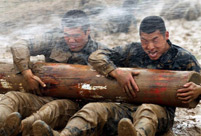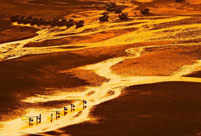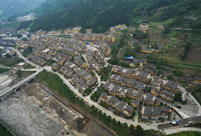BEIJING, May 16 -- The All-China Journalists Association (ACJA)said on Friday that accusations by western journalist groups of press freedom violations in China are "irresponsible" and "do not accord with facts".
MORE OPEN TO FOREIGN REPORTERS
Responding to claims of increased restrictions on foreign media, the association said the Chinese mainland has been more open to overseas media in recent years, especially after regulations concerning foreign journalists and permanent offices of foreign news agencies were introduced in 2008.
"Nowadays, overseas reporters no longer need to file applications in advance for interviews. They only need the interviewee's approval," the association said.
All government departments have designated spokespersons to communicate with reporters from both home and abroad on major issues in a timely manner. News centers have been set up during major events such as national congresses of the Communist Party of China, annual parliamentary sessions, the Beijing Olympic Games and Shanghai World Expo to help foreign reporters.
"China will, as always, adhere to opening up, continue to welcome foreign journalists' news coverage and objective reporting on China, and facilitate their work," the association said.
PRESS FREEDOM INDEX BASELESS
The ACJA expressed strong dissatisfaction against China's bottom ranking in the annual so-called "press freedom index".
"The so-called 'index' deviates seriously from the actual situation in China's news sector," the ACJA said.
"Such practice, which is a sheer slander of China's press freedom, is extremely irresponsible, has obvious ideological bias, and neglects the actual situation of the development of China's news cause," it said.
China has developed a multi-media modern news communication system which includes newspapers, magazines, radio, TV, news agencies and networks since reform and opening up began more than 30 years ago. The public can access to domestic and foreign information via the news outlets.
The government gradually set up and improve laws and regulations on news coverage and communication, such as encouraging media institutions to conduct interviews and supervision of public opinion in accordance with the law and safeguarding journalists' rights.
The ACJA issued a regulation in January this year, promising aid to journalists who die or are injured in the course of their work.
"Without good policies and a relaxed social environment, China's news and communication industry could not have developed so fast and so well," it said.
PRESS FREEDOM WITHIN THE LAW
Responding to accusations that China detained the largest number of journalists in the world, the ACJA acknowledged that there were journalists who had been punished in accordance with the law because of conduct that did not accord with their profession, breaches of the criminal law or jeopardizing the public interest.
"Their criminal activities have undergone the scrutiny of strict judicial process," the association said.
While enjoying ample freedom in news coverage, media institutions must conduct their work within laws and ethics, shoulder social responsibility, say no to fake news and blackmailing, and accept public oversight, it said.
"In any country ruled by law, everyone in the country, irrespective of their profession, should abide by the Constitution and laws," the ACJA said.
"The case is the same in China," it said. "Being a reporter cannot be the reason for allowing a person to disobey the Constitution and law."
ONLINE SECURITY IMPORTANT FOR NATIONAL SECURITY
Responding to the claim that the mainland has hampered freedom on the Internet via reinforced online control in the name of ensuring Internet security, the ACJA said Chinese citizens enjoy ample freedom of expression online.
With an online population of more than 600 million, about 1.25 billion microblog accounts are registered in China and netizens release nearly 30 billion postings a day on the Internet, according to the association.
"Like many countries, China advocates a peaceful, safe, open and cooperative online space, and regards network security as an important part of its national security strategy," it said.
China makes network security a high priority and curbs illegal information which harms national security and public interest, it added.
"This shows the national sovereignty in the Internet space and is a the practice of many countries," the association said.
The ACJA called on various countries to make joint efforts to safeguard the security of the Internet and respect other country's concerns because of their varied situations and cultural traditions.
"We firmly oppose taking online freedom a pretext for interfering in other country's internal affairs," it said.
WESTERN MEDIA'S "DOUBLE STANDARDS"
The ACJA also cast doubt over the "freedom of press" upheld by Western media organizations which, paradoxically, used "double standards" in coverage of a deadly knife attack in southwest China's Kunming.
"The Western media, who always shout for anti-terrorism, human rights and objective coverage, have turned a blind eye to the terrorist attack in Kunming," the association said.
"Some even defended the brutal acts and sought excuses for them," it added.
Some media assumed an ambiguous attitude to the terrorists, calling them "attackers" or "activists" instead of terrorists, it said.
Terrorists with knives slashed frantically at crowds at a railway station in Kunming in southwest China's Yunnan Province on March 1, killing 29 people and injuring 143.
"Obviously, it's double standards," the association said. "They have violated the principle of objectivity and lack professional ethics."
 A bite of Jiang Nan
A bite of Jiang Nan J-11 fighters training in complex meteorological conditions
J-11 fighters training in complex meteorological conditions PLA's tough exercises
PLA's tough exercises Best photos of the week
Best photos of the week  When we are young...
When we are young... Wedding photos of world champion
Wedding photos of world champion "The Most Beautiful Chinese Land"
"The Most Beautiful Chinese Land"  Men experience pains of childbirth on Mother's Day
Men experience pains of childbirth on Mother's Day  Six years after Wenchuan earthquake
Six years after Wenchuan earthquake  8 great movies to watch with your mom
8 great movies to watch with your mom China's most luminous celebrities
China's most luminous celebrities Newly recruited police in Hetian hold drill
Newly recruited police in Hetian hold drill  Bird-men compete flying in Hong Kong
Bird-men compete flying in Hong Kong  The 'Chinese Dad'
The 'Chinese Dad' Shanghai locals bid farewell to childhood memories
Shanghai locals bid farewell to childhood memoriesDay|Week|Month